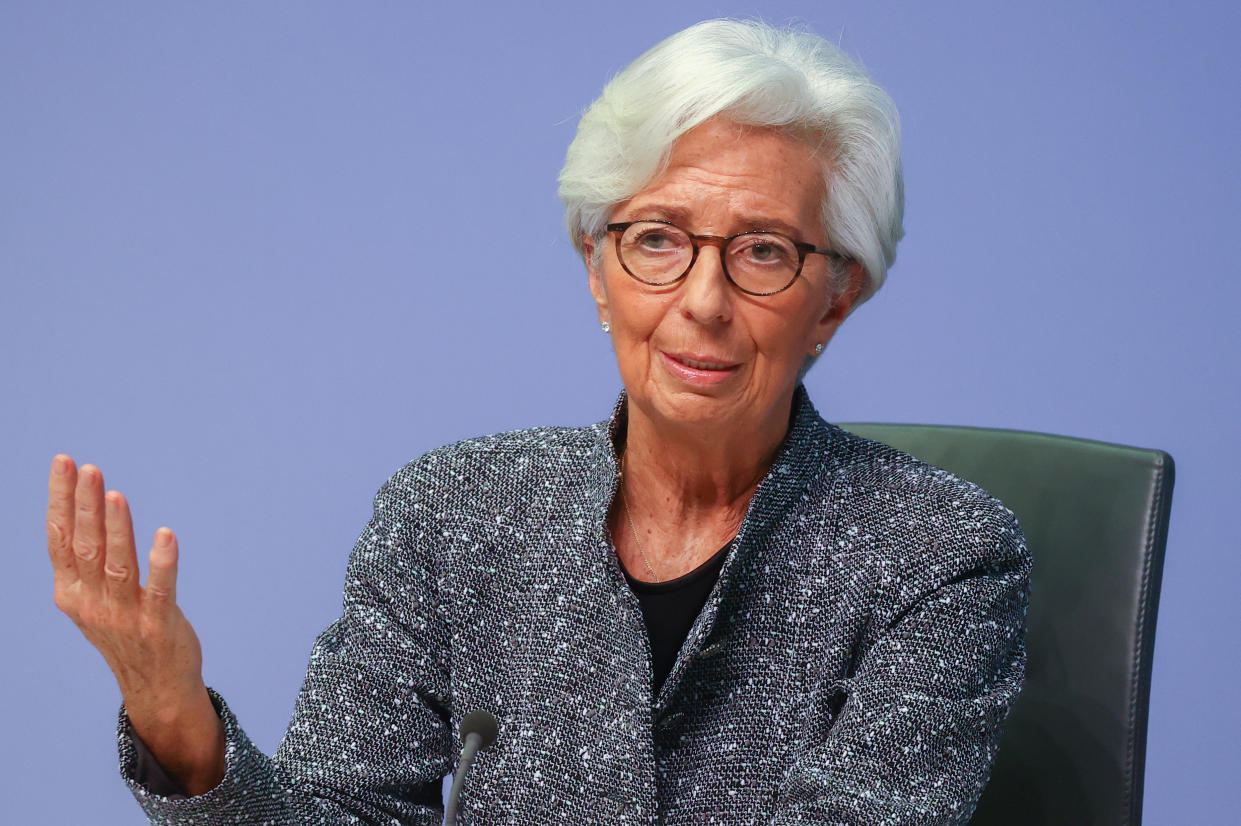Euro surges as ECB expresses confidence in eurozone recovery

The European Central Bank (ECB) on Thursday made no changes to its expansive efforts to tackle the economic impacts of the coronavirus pandemic, leaving interest rates and the size of its mammoth bond-buying programme unchanged.
Though no changes were expected, the decision to maintain its current monetary policy stance comes in spite of markedly weak inflation in the eurozone, and a considerable appreciation in the value of the euro.
The euro climbed further against the dollar (EURUSD=X) on Thursday as markets reacted to the central bank’s apparent confidence in the eurozone’s economic outlook.
Though she noted an apparent slowdown in the services sector, ECB president Christine Lagarde said on Thursday that the eurozone was experiencing “a strong rebound in activity, broadly in line with previous expectations.”
And while she said the outlook was “surrounded by significant uncertainty,” Lagarde exuded optimism about the strength of the bloc’s economic recovery.
READ MORE: LVMH to sue Tiffany for 'mismanagement' of COVID-19
Despite facing repeated questions about the strength of the euro, Lagarde also appeared unperturbed about the currency’s ascent, even as it exerts negative pressure on prices in the eurozone.
Inflation in the eurozone has fallen into negative territory, hitting −0.2% in August, according to preliminary data.
Noting that the bank stood ready to adjust its monetary policy stance, Lagarde said that the bank would “carefully assess” changes in the euro exchange rate, but only insofar as it affected the bloc’s medium-term inflation expectations.
While the ECB targets price stability, and not the exchange rate, the value of the euro has surged in recent months, climbing by more than 4% alone in July.
The currency has gained 10% against the dollar since March, reflecting confidence in the eurozone economy, but also weakness in the dollar following the US Federal Reserve’s decision to move towards a flexible inflation targeting policy.
At the same time, the bank left its inflation projections for 2020 unchanged at 0.3%, while raising its 2021 projection to 1%. Its projection for 2022 remains unchanged at 1.3%, suggesting that inflation will remain well below the bank’s “below, but close to, 2%” target for several years.
The steady 2022 figure, however, masks upward revisions to the bloc’s projections of core inflation, which excludes typically volatile food and energy prices, Lagarde said.
“Our feeling is that the ECB today engaged in an interesting, possibly risky, verbal balancing act, said,” Carsten Brzeski, the chief eurozone economist at Dutch lender ING.
READ MORE: Coronavirus: Millions of households face £1000 cliff-edge next year
“Mentioning the exchange rate in its introductory statement for the first time in more than two years and stressing upward revisions of the (underlying) inflation forecasts could eventually even trigger more euro strengthening,” he said.
The ECB said on Thursday that economic data confirmed the need for “an ample degree of monetary accommodation.”
At −0.5%, the bank’s key interest rate, known as the deposit facility rate, is currently at an all-time low level.
And in June, the bank voted to increase the size of its crisis bond-buying programme by €600bn (£545bn, $710bn).
With identical language to that used after its last meeting in July, the bank said once again on Thursday that it would continue purchases under the €1.35tn pandemic emergency purchase programme (PEPP) “until at least the end of June 2021 and, in any case, until it judges that the coronavirus crisis phase is over.”
The crisis bond-buying programme comes in addition to the ECB’s existing asset-purchasing programme, which sees it buy around €20bn in eurozone bonds each month.


